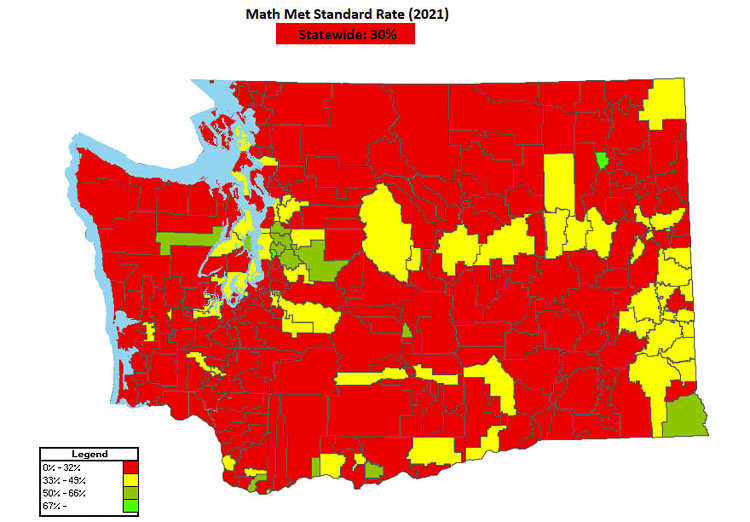Liv Finne of the Washington Policy Center discusses the decline in test scores in reading and math for state tests administered to students in November
Liv Finne
Washington Policy Center
Last week the state superintendent released district-level test scores in reading and math for the state tests administered to students in November 2021. The findings are for the first statewide tests given to students since Gov. Inslee’s COVID lock-down orders started in March 2020.
The latest assessment shows schools failed to meet the standard in teaching math – 70% of students failed – and failed to meet the standard in teaching English – 52% of students failed.
The results for math and English learning are shown in the maps included here.

The long-term consequences of these devastating results are grim. Early numbers show enrollment in Running Start, community college and universities has dropped significantly. The lengthy school shutdown has clearly caused many students to give up the dream of furthering their education.
Even in Seattle, the wealthiest district with highest per-student spending, fully 57% of students failed in math, and 40% failed in English. Seattle leaders boast that their numbers are not as bad as in other districts, but that’s like bragging you have the best-run failing business in your industry.
Even die-hard liberals like Seattle Times columnist Danny Westneat admit public schools are getting terrible headlines. He proposes intensive tutoring. Good idea, but only if the tutoring aid goes directly to families, not into the very school districts that created the learning deficits in the first place.
More broadly, the legislature is considering innovative bills (like HB 1633, SB 5205, HB 1215, and HB 1555) that would provide up to $10,000 a year in direct education assistance to families, to pay for tutors, private school tuition, homeschooling or anything else kids need to learn.
More than 41,000 families have left public education since the lock-down orders started, and school choice is becoming even more popular than it already was. A recent poll shows 71 percent of the public supports giving parents direct assistance to help children learn.
Given the bad experience of the last two years we need to try something new, something that will work. Parents are frustrated about the failure of public schools to meet even the most basic teaching standards, yet they have little ability to affect meaningful change. Broader school choice, however, is a proven way to get families engaged in high-quality education services, so that every child learns.
Liv Finne is the director of the Center for Education at the Washington Policy Center.




